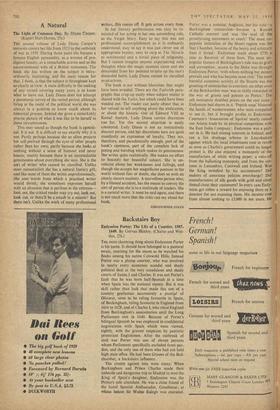A Natural
The Light,of Common Day. By Diana Cooper. (Rupert Hart-Davies, 25s.)
THE second volume of Lady Diana Cooper's memoirs covers her life from 1923 to the outbreak of war in 1939. During those years she became a famous English personality, as a woman of pro- digious beauty, as a remarkable actress and as the unconventional wife of a British statesman. The book she has written on the subject is extra- ordinarily interesting, and the main reason for that, I think, is that the subject is throughout kept so clearly in view. A main difficulty in the making of any record covering many years is to know what to leave out. Lady Diana does not attempt a panoramic survey of the varied period, although living in the midst of the political world she was always in a position to know much about its historical process. Instead she gives a remarkably precise picture of what it was like to be herself in
those circumstances. • This may sound as though the book is egotisti- cal. It is not. It is difficult to say exactly why it is not. Partly perhaps because she so often projects her self-portrait through the eyes of other people rather than her own; partly because she looks at nothing without a sense of humour and never boasts; mainly because there is an unmistakable genuineness about everything she says. She is the sort of writer who cannot be classified. Unlike most memorialists she has a natural literary gift, and like most of them she writes unprofessionally. She uses words from which a practised writer would shrink; she sometimes expresses herself with an abandon that is perilous in the extreme— look out, the critical reader may cry out, look out, look out, or there'll be a smash in a minute! But there isn't. Unlike the work of many professional writers, this comes off. It gets across every time.
In her literary performance one may be re- minded of her acting in her one astonishing role, as the Virgin Mary. Easy to say. this was not professional accomplishment as it is ordinarily understood; easy to say it was just clever use of appropriate beauty; easy to carp at The Miracle as sentimental and a trivial piece of religiosity. But I cannot imagine anyone experiencing such thoughts when the magic moment came and she descended from her pedestal to take up the nun's discarded habit. Lady Diana cannot be classified as an actress.
The book is not without blemishes that might have been 'avoided. There are the Tatlerish para- graphs that crop up easily when subject matter is shared with the Tatler, but which could have been weeded out. The reader can justly object that in her refusal to tell anything about the abdication, or about the historic visit of Edward VIII to Kemal Ataturk, Lady Diana carries discretion too far. Yet this second objection is easily countered. Lady Diana is not an instinctively discreet person, and her discretions here are quite manifestly an expression of loyalty. They are, therefore, and paradoxically enough, part of the book's openness, part of the complete lack of posing and humbug which makes its genuineness. She writes quite realistically. She makes no effort to beautify her beautiful subject. She is un- reticent about her weaknesses and failings, and though she accepts her magnificent position in the world without fuss or doubt, she does so with an utterly sincere modesty. A marvellous person who, by a blessed accident, has the means to convey the sort of person she is to a multitude of readers. She is a natural writer, it must be said again, and there is not much more that the critic can say about her book.
CHRISTOPHER SYKES






































 Previous page
Previous page